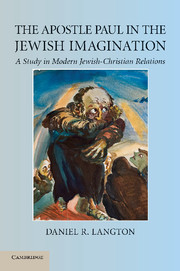Book contents
- Frontmatter
- Contents
- Acknowledgments
- Introduction
- PART I THE APOSTLE PAUL AND POPULAR JEWISH CULTURAL IDENTITY
- PART II THE APOSTLE PAUL AND JEWISH RELIGIOUS IDENTITY: NEW TESTAMENT STUDIES AND THEOLOGICAL APPROACHES
- PART III THE APOSTLE PAUL AND JEWISH INTEREST IN THE JUDEO-CHRISTIAN TRADITION: ARTISTIC AND LITERARY APPROACHES
- PART IV THE APOSTLE PAUL AND JEWISH CRITIQUES OF THE PLACE OF RELIGION IN SOCIETY: PHILOSOPHICAL AND PSYCHOANALYTICAL APPROACHES
- Conclusion
- Appendix: The Story of Abbu Gulish in The Book of Tales
- Bibliography
- Scripture and Other Ancient Writings Index
- General Index
- References
PART III - THE APOSTLE PAUL AND JEWISH INTEREST IN THE JUDEO-CHRISTIAN TRADITION: ARTISTIC AND LITERARY APPROACHES
Published online by Cambridge University Press: 07 May 2010
- Frontmatter
- Contents
- Acknowledgments
- Introduction
- PART I THE APOSTLE PAUL AND POPULAR JEWISH CULTURAL IDENTITY
- PART II THE APOSTLE PAUL AND JEWISH RELIGIOUS IDENTITY: NEW TESTAMENT STUDIES AND THEOLOGICAL APPROACHES
- PART III THE APOSTLE PAUL AND JEWISH INTEREST IN THE JUDEO-CHRISTIAN TRADITION: ARTISTIC AND LITERARY APPROACHES
- PART IV THE APOSTLE PAUL AND JEWISH CRITIQUES OF THE PLACE OF RELIGION IN SOCIETY: PHILOSOPHICAL AND PSYCHOANALYTICAL APPROACHES
- Conclusion
- Appendix: The Story of Abbu Gulish in The Book of Tales
- Bibliography
- Scripture and Other Ancient Writings Index
- General Index
- References
Summary
The origin of the idea of a Judeo-Christian tradition, or heritage, or civilisation, or ethic, lies well before the advent of the modern interfaith movement. It has been suggested that its roots can be traced back to the Enlightenment, when the rationalists and the Deists started disassociating themselves from the adherents of revelational religion, be it Jewish or Christian. Later, in the context of nineteenth-century Christian biblical criticism, (German) Protestant scholars offered a response to Enlightenment criticism, by insisting upon the distinction between Judaism and Christianity, and arguing that profound differences had been evident from the start, in that Pauline Christianity had been the triumph of Gentile, universalising tendencies over the Jewish, particularising tendencies of the Torah-observant Jerusalem Church – in other words, that Christianity may have initially manifested itself as a Judeo-Christian entity, but quickly distinguished itself from Judaism. And during the Nazi period the Deutsche Christen or German Christians similarly aimed to purge Christianity of its Jewish roots; that is, they sought to eradicate any residual elements of Judeo-Christianity from within their faith, which for them, ironically, included the writings of Paul. All these are negative conceptions of ‘Judeo-Christian’, but, according to the Oxford English Dictionary, the term itself first appeared in 1899 in an entirely neutral sense to describe a ‘Judeo-Christian “continuity” theory’. This theory postulated the development of Church ritual out of the practices of Second Temple Judaism.
- Type
- Chapter
- Information
- The Apostle Paul in the Jewish ImaginationA Study in Modern Jewish-Christian Relations, pp. 175 - 177Publisher: Cambridge University PressPrint publication year: 2010



